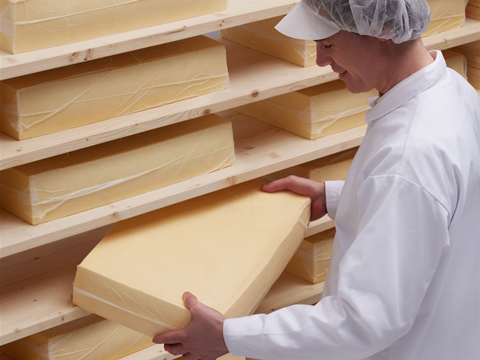
dsm-firmenich and MBM Innovations have combined their respective high-performance maturation membrane and vacuum packaging machines into a recyclable alternative to traditional PVA cheese coatings – claiming to offer the same maturation quality, prevent cheese loss, and unlock lower-energy application.
Conventional PVA cheese coatings are regularly replaced, including as a final step before the cheeses go to market; this is a ‘labour-intensive’ process that can often result in cheese being lost along the way.
Reportedly, the Pack-Age membrane helps to prevent between 5% and 10% of cheese loss during the maturation and processing stages, especially when the coating is removed to slice the cheese. Losses are thought to reduce by up to 7% post-maturation compared to PVA-coated cheese, with Pack-Age said to help dairies get up to 10% more out of their milk.
As such, it “significantly contributes to the sustainable optimization of the cheese production process,” according to Sabrina Mayer-Mai, strategic marketing at MBM.
“Thanks to our breathable Pack-Age membrane, we can reduce food waste and save valuable resources such as milk, water and energy,” continues Mark ten Cate, product application expert for cheese, coatings, and packaging at dsm-firmenich. “At the same time, we are also enhancing product quality.”
The membrane is believed to allow hard and semi-hard cheese to breathe during maturation and optimize its flavour, with cheese treated with Pack-Age said to offer the same flavour and texture balance as naturally matured cheese. Its bioprotective properties delay unwanted mould and yeast growth, according to dsm-firmenich; and, since it requires minimal human intervention, it is expected to reduce the risk of contamination.
The membrane is also designed for easy removal and recyclability via existing plastic recycling streams.
“Naturally ripened cheese remains popular,” Mayer-Mai adds. “Besides the great taste experience, cheese lovers are increasingly seeking products that are natural, sustainably produced, and packaged.”
Meanwhile, MBM Innovations’ fully and semi-automated VSM vacuum packaging machines are compatible with various cheese formats, including round and square formats and sticks. They utilize an atmospheric vacuum system, said to balance gentle handling with high vacuum quality.
Special suction nozzles located within the bag carry out the evacuation process under normal atmospheric pressure, without a vacuum chamber. This is said to achieve a reliable, crease-free seal, even with the thin, delicate Pack-Age membrane.
“Pack-Age membranes contain no polypropylene (PP) or polyethylene (PE), so they do not melt easily,” explains Julia Mayer, product engineer at MBM Innovations. “However, thanks to the bi-active sealing process, we can still guarantee perfect sealing results, even with materials featuring demanding membrane structures.”
Furthermore, the VSM vacuum system claims to save between 36% and 50% of energy compared to other vacuum systems with the same performance. MBM attributes both energy and resource efficiency to the impulse sealing system, small vacuum pumps, and absence of fresh water for cooling and air-blowing for bag opening.
The system also foregoes preheating times and permanently heated plates, which are said to positively impact both energy consumption and machine availability. Furthermore, it utilizes the thinnest possible films and a single-bag process to help reduce film and cheese water, with the machine itself described as durable.
“Our goal is always to minimize product, material, and resource waste – and thereby reduce the CO2 footprint across the entire value chain, from manufacturing our machines to packaging our customers’ products,” says MBM CEO Bernd Mayer.
Once the cheeses have been packaged with MBM’s machines, they can be placed directly into special ripening crates, which are said to provide better ventilation and take up less space than traditional wooden racks.
MBM’s vacuum technology is set to offer ‘significant advantages’ for premium cheeses and other delicate products, while its combination with Pack-Age membranes is anticipated to benefit such naturally matured, semi-hard and hard cheeses as Gouda, Tilsiter, Havarti, or Manchego.
MBM Innovations are currently attending FACHPACK 2024 at Booth 432 in Hall 2; attendees are invited to visit the booth to learn more about the machine concepts and Pack-Age.
Another cheese maturation solution was awarded a German Packaging Award under the ‘Sustainability – Recyclability’ category. LEEB and Dr. Julia Eberhardt were recognised for their mono-material, recyclable soft cheese wrapper, with its specially woven, fleece-like layer acting as an air cushion to ensure that the cheese keeps maturing naturally.
SÜDPACK and Arla Foods also worked together last year to chemically recycle maturing bags for mozzarella cheese; a large-scale test was carried out to chemically recycle 80 tonnes of Rødkærsbro-based dairy plastic into new packaging. The partners sought to keep the multi-layered plastic bags within a circular economy, cut down on fossil feedstock consumption, and reduce CO2 emissions.
If you liked this story, you might also enjoy:
The ultimate guide to the Packaging and Packaging Waste Regulation in 2024
How are the top brands progressing on packaging sustainability?
Sustainable Innovation Report 2024: Current trends and future priorities
Everything you need to know about global plastic sustainability regulation














No comments yet